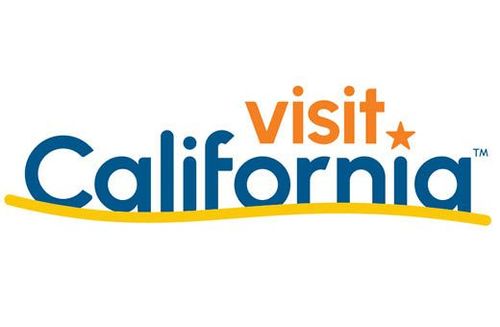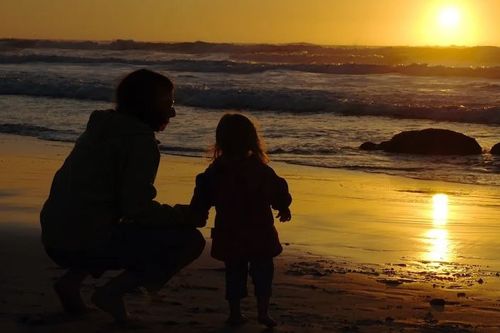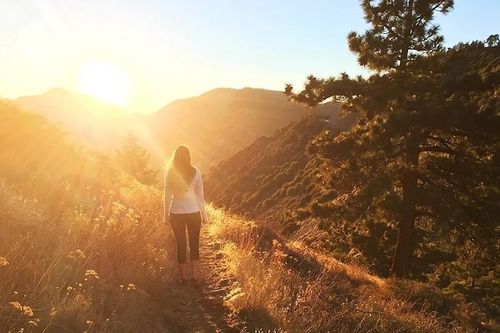Where travel agents earn, learn and save!
Travel & Selling Tips / Free kid-friendly things to do in California
Plan your trip around these classic sights that are also free
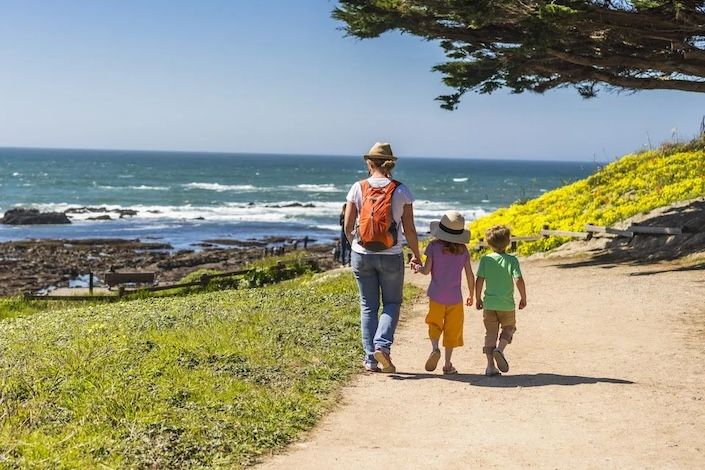
Nothing inspires a sigh of satisfaction on a family vacation quite like seeing that “free admission” sign. Across the Golden State, countless beaches and parks offer free or nearly free public access, but a refreshingly large number of attractions and museums swing their doors wide open, too. Some of California’s top museums are especially family-friendly, offering free admission for kids (such as SFOMA in San Francisco and LACMA in Los Angeles) or even free admission for the whole family, including The Getty Center (you just have to pay for parking) and The Broad in L.A.
While the list of California’s great free attractions includes plenty of famous locations—like the observatory featured in more than one movie—there are also many seemingly hidden gems, such as a butterfly-filled sanctuary near Monterey and a hands-in aquarium right off an L.A. County beach. Check out our list of freebies, listed north to south, that will especially appeal to kids.
State Capitol, Sacramento
With its noble columns and snappy cupola, all painted wedding-cake white, California’s State Capitol building in Sacramento looks like a mini replica of the U.S. Capitol in Washington, D.C. Take a free tour to learn about the 1869 building’s architecture and history. Outside, stroll through the adjacent 40-acre Capitol Park, where you can admire trees from around the world, and visit the Civil War Memorial Grove—in 1897, saplings from famous Civil War battlefields were planted here. (More: State Capitol)
Cable Car Museum, San Francisco
Riding the iconic cable cars is a popular thing to do in San Francisco—but getting to explore them up close takes the experience to a whole other level. Located in Nob Hill, the Cable Car Museum houses three cable cars from the 1870s, including the last remaining car from the Clay Street Hill Railroad. Various tools, grips, track, cable, brakes, and other implements of the method of transport are on display as well. Another great stop: The SF Railway Museum (also free), across from the Ferry Building on the Embarcadero, which looks at the impact of both cable cars and traditional streetcars. You can even feel like a conductor and take the wheel of a full-size replica of a 1911 San Francisco streetcar. (More: Cable Car Museum)
Monarch Grove Sanctuary, Pacific Grove
Tucked between Monterey and Carmel is a fascinating seasonal community: thousands upon thousands of monarch butterflies, which flock to a migration sanctuary just a few blocks from the ocean. For nature-lovers and families, this October through February free attraction is an easy-access marvel. Just don’t touch them—there’s a city ordinance about it, with a hefty fine—but you can ask on-site docents for a closer look with their viewing scopes. Afterward, walk along the rocky coast and preserved dunes at Asilomar State Beach. (More: Monarch Grove Sanctuary)
Piedras Blancas, Central Coast
Five miles up the coast from San Simeon’s Hearst Castle, up to 17,000 walrus-like elephant seals—the West Coast’s largest pinnipeds—pile up like bloated bratwursts on the narrow strip of rocky beach known as Piedras Blancas (white rocks). If you’re an animal lover, get ready to spend hours in this land-based seal rookery, literally steps the highway, where the huge marine mammals breed, birth, molt, and rest. Peak season is December through May; smaller numbers of seals may be seen during other months. Helpful docents from Friends of the Elephant Seal are on site to answer questions. (More: Piedras Blancas)
Heal the Bay Aquarium, Santa Monica
Just steps away from the carnival rides, games, and snack bars of the Santa Monica Pier—in fact, right below Pacific Park’s carousel—sits the Heal the Bay Aquarium (formerly known as the Santa Monica Pier Aquarium). This unassuming attraction offers a fascinating window into the underwater community of its namesake beach town, and houses 100 local species. from charmingly cute sea hares to spooky moray eels. Visitors can stick their hands in the touch tanks to get acquainted with sea cucumbers, urchins, and hermit crabs, or explore the simulated tide exhibit that shows how anemones and juvenile fish do their own version of surfing. Plus, it’s free for kids age 12 and younger and only $5 for adults. (More: Heal the Bay Aquarium)
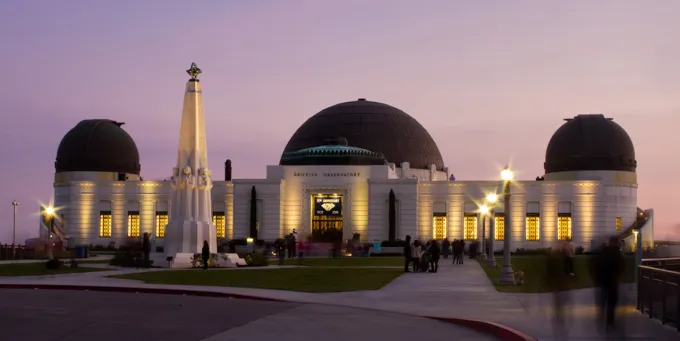
Pedro Szekely/ Flickr
Griffith Park & Observatory, Los Angeles
The largest municipal park in Los Angeles, Griffith Park offers a wealth of outdoor activities and culture to more than 10 million visitors a year. Hikers can choose from more than 50 miles of trails, and unpaved roads provide mountain bikers access to trail rides; guided rides out of Sunset Ranch include great views of the Hollywood sign. The park has a more refined side, too—learn about American Western art at the Autry Museum of the American West, or attend a performance at the open-air Greek Theatre. Kids can get close-up looks at koalas and Komodo dragons at the Los Angeles Zoo & Botanical Gardens. And high on a slope overlooking Los Angeles, the landmark Art Deco-era Griffith Observatory gives you a window to the cosmos. (More: Griffith Park & Observatory)
Hollywood Walk of Fame
When you’re in Tinseltown, taking a selfie on this stretch of sidewalk is practically a rite of passage—and it’s also one of the city’s most beloved free year-round attractions. Honoring luminaries in motion pictures, television, radio, live theatre, and recording since 1960, the stars on the Hollywood Walk of Fame are unveiled at free public ceremonies, which are often attended by honorees and their celebrity entourages—a great way to see stars if that’s one of your Hollywood goals (and isn’t it everyone’s?). Want to find a particular one? Use the Walk of Fame’s online Star Search tool to send you to the location for your dream photo op. (More: Hollywood Walk of Fame)
Exposition Park, Los Angeles
With green spaces and gardens, museums, and assorted playing fields, Los Angeles’ Exposition Park is a place for playing, learning, and being entertained. Most of its museums and attractions are free. A quick stroll takes you to the impressive California Science Center, with hands-on exhibits and a dramatic centerpiece—the Space Shuttle Endeavour. Or, check out paintings, sculpture, photography, and video exhibits at the excellent California African American Museum. Dino-fans, meanwhile, flock to the Natural History Museum of Los Angeles County to see the impressive collection of prehistoric creatures, especially a remarkable trio of complete T. rex skeletons. (More: Exposition Park)

David McNew/Getty Images
Big Morongo Wildlife Reserve
This easy-access desert oasis offers the chance to explore a diverse landscape and see a lot of desert critters up close. Set between Palm Springs and Joshua Tree National Park in the Little San Bernardino Mountains, the Big Morongo Canyon Preserve boasts a wide array of flora and fauna. Hike one of the many trails (which include a wheelchair-accessible boardwalk) through the stream and marsh habitats. Along the way, you may easily spot a variety of kangaroo rats, mule deer, and possibly even bobcats and bighorn sheep. Look up, especially during spring and fall migration, and you can see representatives of some 240 species of birds. Fall, winter, and spring are the prime times to visit, when the average temperatures range between the 60s and about 80. (More: Big Morongo Wildlife Reserve)
Pacific Marine Mammal Center, Laguna Beach
Sea lions and seals are on the mend at this Laguna Beach marine mammal rescue center—the first of its kind in the state of California. Inside, you can see ones that have been rescued between Seal Beach, south of Long Beach, and San Onofre, on the north end of San Diego County. They are recovering from any number of maladies—from dehydration to shark bites, fish hook injuries to respiratory infections. Check out the before-and-after photos of the center’s many success stories, then stand by the pools to watch the seals and sea lions that are feeling better—and are almost ready to head back to the wild—bark and play with each other. (More: Pacific Marine Mammal Center)



